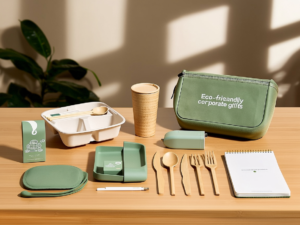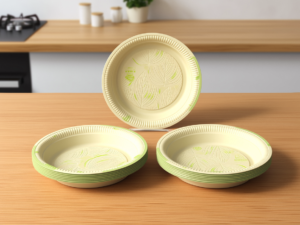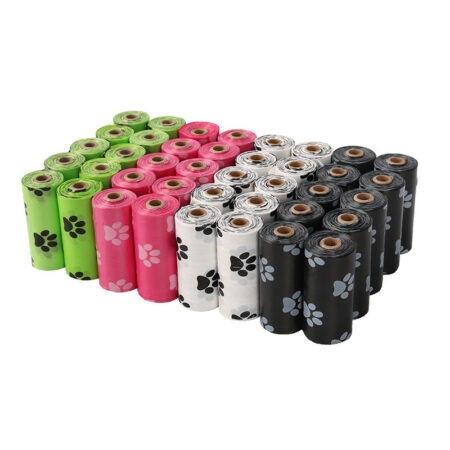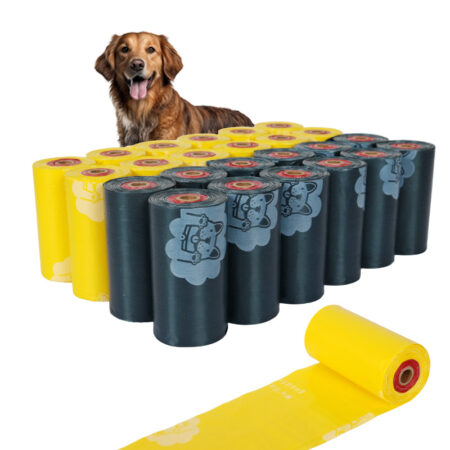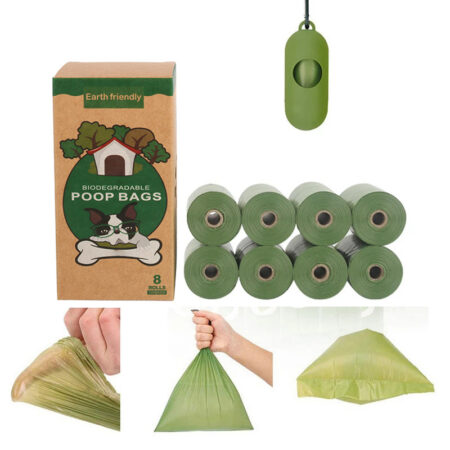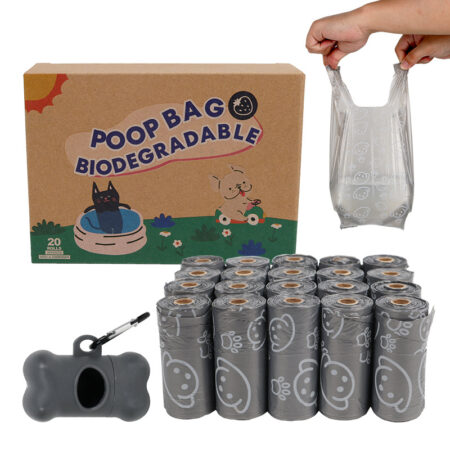Table of Contents
Why Resin Choice Dictates Bag Performance: The Truth About “Is Resin Biodegradable?”
As a leading biodegradable trash bag supplier, we know resin selection makes or breaks your eco-friendly product line. But first, let‘’s answer the critical question: Is resin truly biodegradable?

The Biodegradability Myth: Not All Resins Are Equal
Many buyers assume “biodegradable resin” means quick decomposition in any environment – this is dangerously incorrect.
The foundation of any quality biodegradable trash bag lies in its resin composition. Not all resins marketed as “biodegradable” actually meet international composting standards, making material selection crucial for product performance and compliance.
Defining Truly Biodegradable Resins Resins can only be considered properly biodegradable when they meet specific scientific criteria:
- Complete breakdown into natural elements (water, CO₂, biomass)
- Verified decomposition within defined timeframes
- Certification under recognized standards (AS4736, EN13432, ASTM D6400)
Commercial Resin Types and Their Properties Three main resin categories dominate the biodegradable trash bag market:
PBAT-Based Resins
Combine petroleum-derived components with biodegradable additives
Offer excellent strength and flexibility (30N+ tear resistance)
Certified for both industrial and home composting (AS5810)
Ideal for heavy-duty applications like extra large dog waste bags
PLA-Based Resins
Derived from renewable corn starch
Provide good clarity and stiffness
Require industrial composting conditions (50-60°C)
Often blended with PBAT to improve flexibility
PHA Resins
Fully bio-based and marine-degradable
Highest cost option (3x PBAT price)
Used in specialty applications like marine waste bags
Many buyers assume “biodegradable resin” means quick decomposition in any environment – this is dangerously incorrect.
✅ Certified Biodegradable Resins (Our Focus):
- PBAT (Polybutyrate Adipate Terephthalate):
- Petroleum-based but EN 13432/AS4736 certified compostable
- Breaks down into CO₂, water, and biomass under industrial composting
- PLA (Polylactic Acid):
- Cornstarch-derived, industrially compostable (not home compostable)
- PHA (Polyhydroxyalkanoates):
- Marine-degradable but costs 3X PBAT
❌ Greenwashing Alerts:
- “Oxo-degradable” resins (fragment into microplastics)
- “Partially bio-based” blends without certification
Supplier Tip: Always demand BPI/ASTM/AS4736 test reports – we provide these for every resin batch.
Performance Considerations for Bag Manufacturers
Your resin choice directly impacts:
Tear Resistance (Critical for dog poop bags):
- Pure PLA bags snap at 15N force → PBAT blends withstand 30N+
Decomposition Timeline (Key for compliance):
| Resin Type | Industrial Compost | Home Compost | Landfill |
| PBAT | 90 days | 12-24 months | ❌ No |
| PLA | 60 days | ❌ No | ❌ No |
| PHA | 30-60 days | 6-12 months | 2-5 years* |
Cost vs. Compliance Tradeoffs
100% PBAT bags pass all tests but cost $0.12/unit
Blending 30% PLA cuts cost to $0.08/unit while keeping AS4736 certification
Certification Requirements Proper documentation ensures compliance:
- AS4736 certification mandatory for Australian market
- BPI certification preferred for North America
- EN13432 required for European sales
Practical Recommendations for Buyers
When sourcing materials for biodegradable bags:
- Always verify certifications match target market requirements
- Consider end-use environment when selecting resin types
- Evaluate blend options to optimize cost/performance ratio
- Request test reports for both mechanical properties and decomposition rates
For commercial buyers, understanding these resin fundamentals ensures production of trash bags that meet both performance expectations and environmental claims. Proper material selection prevents costly compliance issues and product failures in the field.
Resin Questions – Answered
❓ “Can I call my bags ‘biodegradable’ if they use PBAT?”
→ Only if certified (e.g., BPI/AS4736). Uncertified PBAT degrades too slowly.
❓ “Why do some resins require industrial composting?”
→ PLA needs 50-60°C to break down – impossible in backyard piles.
Key Takeaways for Buyers
1️⃣ “Biodegradable resin” ≠ automatically compostable – demand certifications
2️⃣ PBAT is the safest bet for durable, certified-compostable trash bags from compostable bags wholesale
3️⃣ Blending resins optimizes cost without sacrificing compliance
Send us your bag specs → Get a tailored resin recommendation + MOQ pricing within 24 hours.
Material Analysis: Optimizing Resin Selection for Eco-Conscious Bag Manufacturing
Understanding resin properties is crucial for producing high-performance environmentally friendly resin products. Our analysis is based on industry-standard technical specifications rather than market pricing data.
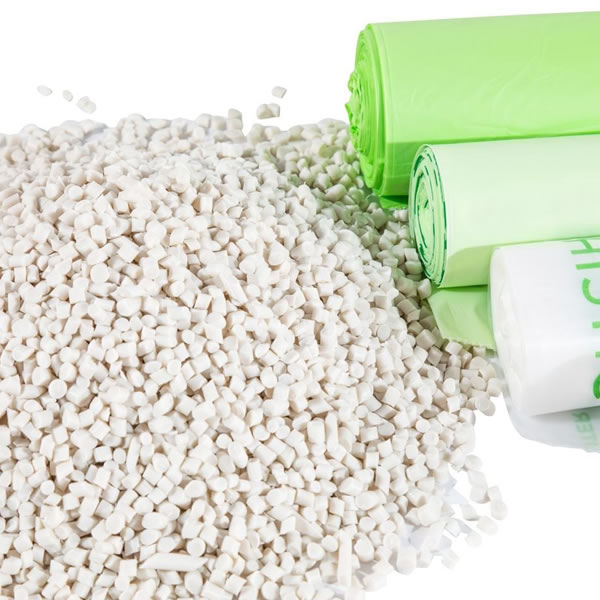
Certified Sustainable Resins for Bag Production:
PBAT (Polybutylene Adipate Terephthalate)
- Mechanical Properties:
- Tensile strength: ≥30MPa (ASTM D638)
- Elongation at break: ≥600% (ASTM D882)
- Decomposition Standards:
- Certified compostable (AS4736, EN13432, ASTM D6400)
- Industrial composting timeframe: 6-12 weeks
- Industry Applications:
- Heavy-duty compostable bags
- Pet waste bags requiring tear resistance
- Thick gauge bin liners
PLA (Polylactic Acid)
- Technical Characteristics:
- Tensile strength: 50-70 MPa (NatureWorks LLC technical data)
- Heat deflection temperature: 55-60°C
- Decomposition Requirements:
- Industrial composting facilities only
- Minimum 58°C for effective breakdown
- Processing Considerations:
- Typically blended with other biodegradable resin types
- Requires modified extrusion equipment
Starch-Based Composites
- Material Composition:
- Typically 30-50% plant starch content
- Often combined with PBAT copolymer
- Performance Tradeoffs:
- Reduced water resistance compared to pure polymers
- Faster decomposition in home composting systems
- Certification Status:
- Meets AS4736 Class H for home compostability
- Limited mechanical strength over time
Technical Selection Criteria
- Certification Verification
- Third-party validation requirements vary by market
- Australia: AS standards compliance documentation
- Europe: EN certification proof points
- Production Parameters
- Processing temperature ranges by resin type
- Equipment compatibility considerations
- Film blowing technical requirements
- Performance Priorities
- Strength versus degradation rate balance
- End-use environment conditions
- Shelf life expectations
Environmental Considerations: How Resin Selection Shapes Your Sustainability Claims
The Truth About “Green” Resins
Not all biodegradable resin products are equally eco-friendly. Misleading material choices can damage brand credibility and lead to:
⚠️ Greenwashing accusations (e.g., “compostable” bags that only break down in specialized facilities)
⚠️ Product failures (e.g., ASTM-certified bags failing in real-world conditions)
⚠️ Certification violations (e.g., non-compliance with AS4736 home compost standards)
Critical Debate Points in Sustainable Resins
- Industrial vs. Home Compostability
PLA Resins: Require high-temperature industrial composting (58°C+) – not viable for households
Certified PBAT Blends: Pass AS5810 home compost tests (20-30°C breakdown)
Starch-Enhanced Resins: Faster decomposition but lower durability - Fossil Fuel Content in “Bio-Based” Resins
Most biodegradable resin products still contain petroleum-derived components:
PBAT: Typically 40-60% fossil-based
Truly bio-based alternatives (e.g., PHA) cost 300-500% more - Regional Disposal Realities
Australia: Only 23% of organic waste reaches industrial composting facilities
Solution: For extra large dog poop bags, specify resins that degrade in:
Home compost bins (AS5810)
Soil environments (OK Soil certification)
Brand Protection Strategies
✅ Transparency First
Clearly label composting requirements (e.g., “Industrial Composting Only”)
Publish resin composition percentages (e.g., “60% PLA + 40% PBAT”)
✅ Certification Stacking
Combine:
BPI (North America)
AS4736 (Australia)
OK Compost (Europe)
✅ Performance Warranties
Offer:
Shelf-life guarantees (e.g., “Maintains strength for 18 months”)
Degradation timelines (e.g., “90% breakdown within 6 months in industrial compost”)
Core Applications: How We Engineer Resins for High-Performance Bags
Optimized Resin Formulas for Market-Leading Products
Our biodegradable resin solutions are specifically formulated for real-world bag applications, balancing durability, decomposition rates, and cost-efficiency. Below are our best-selling bag categories and their customized material compositions:
Extra Large Dog Poop Bags (AS5810-Certified)
- Resin Blend: 70% PBAT + 30% Cornstarch
- Key Features:
- High tear resistance (withstands 30N+ puncture force)
- Certified for home composting (6-12 month decomposition)
- Scent-neutral formula (no chemical masking agents)
- Why This Works: PBAT provides flexibility, while cornstarch enhances biodegradation in backyard compost heaps.
Compost Bin Liners (AS4736 Industrial Standard)
- Resin Blend: 50% PLA + 50% PBAT
- Key Features:
- Leak-proof seals (hot-welded edges)
- 20L-50L capacity options
- UV-stabilized for outdoor bin use
- Why This Works: The PLA/PBAT mix offers stiffness for easy loading while maintaining compostability.
Retail Shopping Bags (BPI Certified)
- Resin Blend: 80% PLA + 20% Mineral Fillers
- Key Features:
- Thin but strong (15-20μm thickness)
- Glossy print surface for branding
- Food-safe (FDA-compliant)
- Why This Works: Mineral additives reduce cost while maintaining rigidity for carry stability.
Heavy-Duty Garden Waste Bags (OK Compost INDUSTRIAL)
- Resin Blend: 60% PBAT + 40% Starch + Reinforcement Fibers
- Key Features:
- 50μm+ thickness for thorn/branch resistance
- Breathable micro-perforations
- Natural beige color (no dyes)
- Why This Works: Fiber reinforcement prevents tearing when handling sharp organic waste.
Technical Comparison Table
| Bag Type | Resin Formula | Certifications | Decomposition Time |
|---|---|---|---|
| Dog Poop Bags | PBAT + Cornstarch | AS5810 | 12 months (home) |
| Compost Liners | PLA + PBAT | AS4736 | 90 days (industrial) |
| Shopping Bags | PLA + Minerals | BPI | 180 days (industrial) |
| Garden Waste | PBAT + Starch + Fibers | OK Compost INDUSTRIAL | 120 days |
Customization Available:
✔ Adjust resin ratios for climate conditions (e.g., hotter regions may need higher PBAT content)
✔ Customize thickness (+/- 5μm) without compromising certifications
✔ Add anti-static agents for automated filling machines
Procurement Challenges: Navigating Biodegradable Resin Supply for Bag Manufacturers
Key Challenges in Sourcing Sustainable Resins
- Certification Compliance Complexity
- Manufacturers must verify multiple certifications:
- AS 4736 (Australia)
- EN 13432 (Europe)
- ASTM D6400 (North America)
- Testing requirements vary by market (Source: BPI Certification Guide: https://bpiworld.org/page/Standards)
- Material Consistency Issues
- Batch-to-batch variations in:
- Melt flow index (±10% tolerance)
- Degradation rates (affected by storage conditions)
- Solution: Request certificates of analysis for each shipment
- Limited Global Production Capacity
- Current PBAT production capacity: ≈1.5 million tons/year worldwide
- PLA production capacity: ≈500,000 tons/year (Source: European Bioplastics Market Data 2023: https://www.european-bioplastics.org/market/)
- Technical Processing Challenges
- Different extrusion parameters vs. conventional plastics:
- Lower melting points (160-180°C vs 200+°C for LDPE)
- Narrower processing windows
- Requires equipment modifications
Verification Protocol for Buyers
- Supplier Qualification Checklist
- Valid ISO 9001 certification
- Batch-specific test reports
- On-site production audit capability
- Minimum 2-year supply track record
- Material Testing Requirements
- 3rd party verification of:
- Tensile strength (ASTM D638)
- Elongation at break (ASTM D882)
- Degradation rate (ISO 14855)
- Sample Evaluation Process
- Minimum 3 production batches tested
- 90-day real-time aging test recommended
- Field testing in intended application
Industry Solutions
- Pre-Certified Compound Suppliers
- Benefit: Reduced testing burden
- Technical Support Availability
- Look for suppliers providing:
- Processing guides
- Troubleshooting assistance
- Application engineers
Smarter Sourcing for Sustainable Bag Production
Key Takeaways for Manufacturers: ✓
- Material Selection Dictates Performance
- PBAT blends offer optimal balance for most compostable bag applications
- PLA requires industrial composting facilities (verify local availability)
- Starch composites reduce cost but require careful moisture control
- Certification Verification is Mandatory
- Require current test reports matching your target markets:
- Australia: AS 4736/AS 5810 certificates
- Europe: EN 13432 documentation
- North America: BPI certification
- Supply Chain Transparency Matters
- Audit suppliers for:
- ISO 9001 certification
- Batch traceability systems
- Real degradation test videos
✅ Request Free Technical Consultation
Get customized resin recommendations based on:
- Your equipment specifications
- Target market requirements
- Budget parameters

